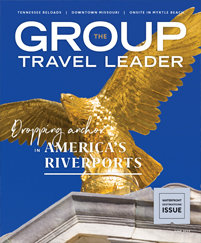A trip through the mid-South introduces travelers to some of the Civil Rights Movement’s most memorable figures and martyrs, from the Little Rock Nine to Martin Luther King Jr. They can also experience the roots of Black culture, with stops at music museums, historic districts and educational institutions.
Beginning in Mississippi’s capital, Jackson, this itinerary takes travelers north to Sumner, then through Tennessee with stops in Memphis and Nashville. It ends with a stop in Louisville, Kentucky.
Jackson, Mississippi
Mississippi’s capital entices visitors with literature, art and music. Groups can tour cultural attractions such as Malaco Records, the largest blues, gospel and Southern music recording studio in the country; the Mississippi Museum of Art; and the Eudora Welty House and Gardens, a literary house museum. But Jackson’s culture is also deeply intertwined with its Civil Rights heritage. Medgar Evers, a prominent NAACP member and activist, was assassinated in 1963 at his home in Jackson. The quaint, mint-green home was declared a National Historic Landmark and named the Medgar and Myrlie Evers Home National Monument and can be toured. Travelers can also visit the Mississippi Civil Rights Museum, which contains exhibits examining the lives and slayings of prominent figures from the movement, such as Evers.
Sumner, Mississippi
This small town of Sumner in Tallahatchie County, Mississippi, only has a population of a couple hundred, yet it’s worth visiting for travelers who want to understand the solemn reality of racial injustice during the Civil Rights era. The town explores the tragic story of Emmett Till, a Black 14-year-old boy who was kidnapped and lynched for allegedly offending a white woman. An all-white jury acquitted his murderers. Till’s murder — and the lack of justice for his killers — outraged the nation and sparked an uptick of support and activism for the Civil Rights Movement. Visitors can tour the Tallahatchie County Courthouse — now a museum — where Till’s murder trial was held. Across the street from the courthouse, they will find the Emmett Till Interpretive Center.
civilrightstrail.com/destination/sumner
Little Rock, Arkansas
The capital of Arkansas is also known for its connections to former President Bill Clinton, making the Clinton Presidential Library and Museum one of the city’s most popular attractions, along with an eclectic assortment of other museums. Little Rock is also known for the Little Rock Nine, nine Black students who were supposed to attend Little Rock Central High School in 1957. Met with protests by both Arkansas’ governor and its citizens, these students were escorted to their classes by federal troops, bringing them into the center of the effort to integrate schools. They are honored at both the Little Rock Central High School National Historic Site and a memorial at the Arkansas Capitol. For further exploration of the state’s Black history, travelers can visit the Mosaic Templars Cultural Center.
Memphis, Tennessee
In the southwest corner of Tennessee, Memphis’ connections to the blues, rock ’n’ roll, jazz and soul music, and musicians like Elvis Presley, Aretha Franklin and B.B. King, provide plenty of musical attractions for groups to explore. These include Beale Street Historic District, where many Black-owned nightclubs, restaurants and shops thrived, and WDIA Radio Station, the first station in the country created for a Black audience. Downtown, the National Civil Rights Museum at the Lorraine Hotel displays exhibits related to the movement, including the hotel room where Martin Luther King Jr. was staying when he was assassinated on the hotel balcony in 1968. Visitors to Memphis will also want to see Mason Temple Church of God in Christ, where King gave his last speech the day before his death.
Nashville, Tennessee
Known worldwide as Music City, Nashville’s upbeat tempo and laid-back rhythm are sure to delight visitors. The city is home to famous attractions such as the Country Music Hall of Fame, complete with rotating exhibits and plenty of programming, but it’s also home to the National Museum of African American Music. Other related sites include Clark Memorial United Methodist Church, where Martin Luther King Jr. held the 1961 annual Southern Christian Leadership Conference meeting. There’s also Fisk University, founded in 1866 to educate Black students. It’s the city’s oldest institution for higher education and the first historically Black college to be accredited by the Southern Association of Colleges and Schools. Alumni include Ida B. Wells and John Lewis.
Louisville, Kentucky
Louisville is Kentucky’s largest city and comes with plenty of opportunities to experience the essence of the state’s culture. Some of its most popular offerings include trips to Churchill Downs and the Derby Museum, as well as outings to Whiskey Row, a preserved historic district boasting bourbon distilleries and experiences. It also has two Civil Rights sites: the Muhammad Ali Center, which lets visitors explore the legacy of the famed athlete, activist and philanthropist; and the Louisville Downtown Civil Rights Trail, which marks 11 of the existing locations in the city that were significant to the Civil Rights Movement, including places where activists staged demonstrations to campaign against segregation. Travelers can complete an educational, self-guided tour with stops at each.











